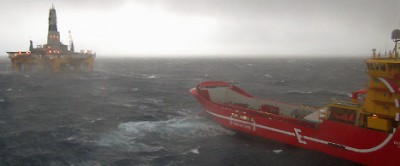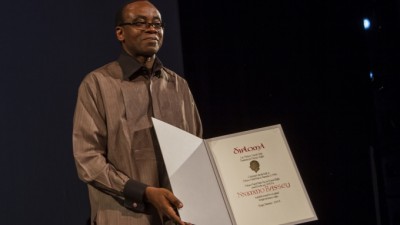Just a day after the winner of this year’s Rafto Prize warned in Bergen that oil companies are “destroying lives” with environmentally irresponsible drilling, comes news that another of Norway’s major trade union organizations wants drilling to start off Norway’s own scenic Lofoten as early as next year. Conflicts over oil exploration and production are clearly gushing once again.

Rafto Laureate Nnimmo Bassey could only be shaking his head over the demands made by trade union association Fellesforbundet in newspaper Klassekampen on Monday. After being applauded at the Rafto ceremony on Sunday, given a podium for his criticism of the oil industry and hailed with a torchlight ceremony through the streets of Bergen, Bassey woke up to more evidence that his pleas to protect sensitive areas from drilling often fall on deaf ears, also in the allegedly environmentally conscious country honouring him.
Bassey has seen all too clearly how oil exploration and drilling have severely polluted his native Nigeria, where he claims the equivalent of the contents of one Exxon Valdez tanker is “spewed into our environment yearly.” He was referring to the huge vessel that ran aground off Alaska more than two decades ago and set off one of the biggest oil spills in history.

Bassey, an environmentalist and poet, traveled to Norway to collect his prize awarded annually to human rights activists. His struggle to rein in the oil industry’s pollution of his country and win compensation for the damage already done was the reason the Bergen-based Rafto Foundation awarded him the prize, which earlier has gone to several persons who went on to win the Nobel Peace Prize.
Bassey wasted no time in criticizing oil companies from Exxon to Norway’s own Statoil. He believes it’s high time for bans on oil exploration and production to be placed on especially vulnerable areas around the world, from the Arctic and scenic Lofoten peninsula off Northern Norway to the Rift Valley in Africa. The risk of spills is one thing, he notes, while the climate impact from oil operations is real. He thinks it’s wrong when profit comes before both climate and people, pointing to how more than 50 years of oil activity in Nigeria have left people “born, living, dying and buried in pollution.”
French oil company Total recently became one of the first international oil companies to warn against oil exploration in sensitive Arctic areas. Total chief executive Christophe de Margerie told the newspaper Financial Times that he fears the consequences of a major oil spill in the Arctic, not least for the reputation of his company if it was involved. Total has several gas projects in the Arctic, but de Margerie thinks gas leaks are easier to deal with than oil spills. He think drilling in the Arctic carries risks that are too high.
Most oil companies keen to drill
Several other companies, including Norway’s Statoil, are surging forward with Arctic projects and claim they’re well-prepared to handle any accidents. Statoil chief executive Helge Lund has been keen to drill off of scenic Lofoten for years and now he has even more support from labour groups who want the jobs that oil production brings.
The head of Norway’s largest industrial trade union federation, Arve Bakke, told newspaper Klassekampen on Monday that the seas off Lofoten and Vesterålen in northern Norway should be opened up for oil exploration next autumn. Bakke doesn’t think any area along the Norwegian coast should be protected from drilling activity.
“We shall exploit resources in line with knowledge, technology and competence,” said Bakke, who also sits on a key board of the Labour Party along with the head of Norwegian labour confederation LO, Roar Flåten. He claimed that petroleum operations will be carried out in “a sustainable manner for the environment and nature.”
‘Completely irresponsible’
He claims the industry has enough know-how to drill and extract oil without harming the environment. “The point isn’t employment, it’s about natural development,” Bakke told Klassekampen. “When we know enough and have the knowledge, competence and technology, when the fishing industry and environmental protection are taken care of, there’s no reason to delay drilling up there.”
Flåthen of LO has already embraced efforts to spur more drilling in Arctic areas, also off Lofoten. If Bakke’s view is adopted at the LO congress in May, the pressure to open up Lofoten and Vesterålen to drilling will greatly increase.
Lars Haltbrekken, leader of Norway’s chapter of Friends of the Earth, was predictably opposed to Bakke’s claims in Klassekampen. He called them “completely irresponsible” and claimed there’s no new knowledge or information to suggest it’s any safer or less risky to drill off Lofoten and Vesterålen now than it was when the government delayed approval for it last year.
Views and News from Norway/Nina Berglund
Please support our news service. Readers in Norway can use our donor account. Our international readers can click on our “Donate” button:

